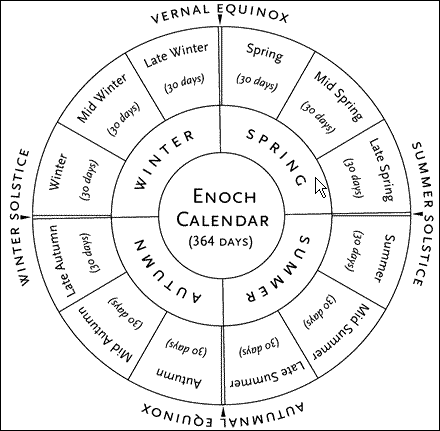This past week at our fall camp-out I did a presentation on what I understand the Torah to be testifying to concerning when the Sabbath days fall out on the 364-day solar year model put forth in the Book of Enoch.
 It’s been a few years since I discovered this layout, and I’ve been relatively quiet in discussing this subject publicly because I have not been able to reconcile how that model would play out in a modern setting given what we experience with a 365.24 day solar year.
It’s been a few years since I discovered this layout, and I’ve been relatively quiet in discussing this subject publicly because I have not been able to reconcile how that model would play out in a modern setting given what we experience with a 365.24 day solar year.
However, more recently I’ve been associating with some folks who esteem the 364-day priestly calendar discussed among the Dead Sea Scrolls, and they had never heard my take on these findings, so I thought it worthwhile to share it with them.
I thank Jackson Snyder for making this recording available and sharing it on his Jackson Snyder presents program on Hebrew Nation Radio. I hope to provide more presentations like these in the future, both as a podcast and in video format.
When is the Shabbat/Sabbath Day?
In this particular presentation, I reference a 4-page packet. Here are the .pdfs of that packet for your reference: Page 1, Page 2, Page 3, and Page 4.
Let me know what you think.


I was wondering on keeping Sabbath, do you also rest during the evening and do you consider the evening before Sabbath or after the rest from labor? Do you have more scriptures for this or a blog post that you could direct me to read?
The natural flow of day and night when considering life in the natural world is that when it becomes light out in the morning one can begin to see in order to go about their day’s work/business, and then as the light grows dim, one would naturally begin to refrain from their work. So, every day there is a natural ceasing of labor towards the end of the day.
For those choosing to live outside the natural world using artificial light, depending on the kind of work they do, they can work throughout the night. I choose to live by the light of the natural world as much as possible, so I typically rest in the evenings and don’t return to work until the dawn of a new day — or at least that is my general intention.